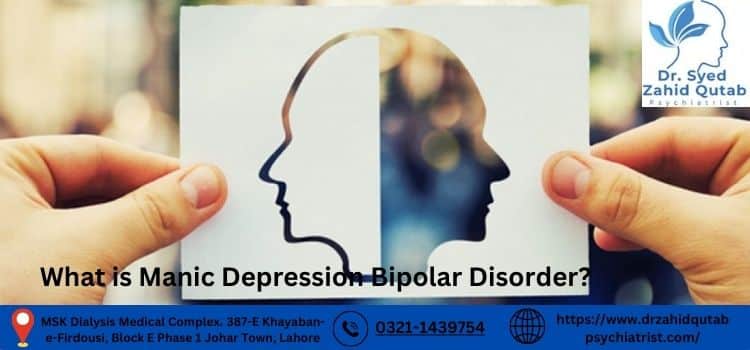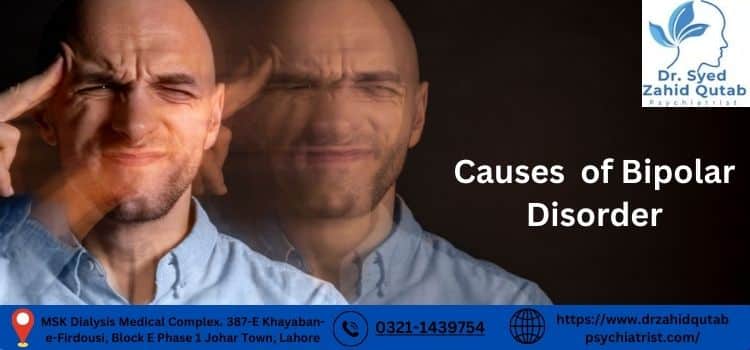If you’ve ever felt down, depressed, or experienced massive swings in your moods and energy levels, it may be time to consider whether you’re struggling with a form of mental illness known as manic depression bipolar disorder. Now the question is what is manic depression bipolar disorder?
In this blog post, we will explore what manic depression bipolar disorder is, its symptoms, and treatments available that have worked for others diagnosed with the condition.
Read more to get further details.
What is Manic Depression Bipolar Disorder?

Also known as bipolar disorder, manic depression bipolar disorder is a mental health condition that causes extreme shifts in mood, energy levels, and behavior. People with this disorder experience intense highs (mania) and lows (depression) that can significantly impact their daily lives. These mood swings can occur suddenly or gradually over weeks or months.
Manic depression bipolar disorder is a chronic condition that requires lifelong management, but with proper treatment and support, individuals can lead fulfilling lives.
Types of Manic Depression Bipolar Disorder
There are three main types of manic depression bipolar disorder:
- Bipolar I: This is the most severe form of the disorder and is characterized by at least one manic episode lasting for at least a week or requiring hospitalization. Individuals with this type may also experience episodes of major depression.
- Bipolar II: This type is characterized by less severe manic episodes, called hypomania, and at least one major depressive episode.
- Cyclothymic disorder: People with this type experience brief periods of hypo/manic symptoms alternating with brief periods of depressive symptoms. These symptoms are less severe and do not meet the criteria for a full manic or major depressive episode.
Symptoms of Manic Depression Bipolar Disorder
People with bipolar disorder can experience both manic/hypomanic and depressive episodes. The symptoms of manic depression bipolar disorder can vary from person to person, but some common signs include:
Symptoms of Manic Episode
- Abnormally elevated mood or irritability
- Overthinking/Racing thoughts and rapid speech
- Increased energy and activity levels
- Decreased need for sleep
- Impulsive or reckless behavior, such as spending sprees or risky sexual encounters
- Grandiosity or inflated self-esteem
Symptoms of Hypomanic Episode
Hypomanic episodes are similar to manic episodes, but the symptoms are less severe and do not cause significant impairment in daily functioning. Some common signs include:
- Elevated mood or irritability
- Increased energy and activity levels
- Racing thoughts and rapid speech
- Decreased need for sleep
- Impulsive behavior or risky decision-making
Symptoms of Depressive Episode
- Persistent feelings of sadness or emptiness
- Loss of interest in previously enjoyed activities
- Changes in sleep patterns (either insomnia or excessive sleeping)
- Changes in appetite or weight
- Fatigue or loss of energy
- Feelings of worthlessness or guilt
- Difficulty concentrating or making decisions
- Suicidal thoughts or behaviors
- Lack of motivation
Signs and Symptoms of a Mixed Episode
A mixed episode is characterized by both manic/hypomanic and depressive symptoms occurring at the same time. This can be a particularly dangerous state, as it may increase the risk of self-harm or suicide.
It’s important to note that not everyone with bipolar disorder will experience all of these symptoms, and the severity can also vary. If you are experiencing any of these symptoms, it’s important to seek help from a mental health professional.
Causes of Manic Depression Bipolar Disorder

The exact cause of manic depression bipolar disorder is still unknown. However, several factors may contribute to its development, including:
- Genetics: Studies have shown that people with a family history of bipolar disorder are more likely to develop the condition themselves.
- Brain chemistry: Imbalances in certain brain chemicals (neurotransmitters) such as serotonin and dopamine may play a role in manic depression bipolar disorder.
- Environmental factors: Trauma, major life changes, or prolonged stress may trigger the onset of symptoms in individuals who are already predisposed to the condition.
Who Does Bipolar Disorder Affect?
Bipolar disorder affects approximately 2.8% of the population, with men and women being equally affected. It can occur at any age, but it most commonly develops in late adolescence or early adulthood. Children can also develop the condition, although it is less common.
Treatment for Manic Depression Bipolar Disorder
There is no cure for manic depression bipolar disorder, but it can be effectively managed with a combination of medication and therapy. Some common treatment options include:
- Mood stabilizers: These medications help regulate mood swings and prevent episodes of mania or depression.
- Antidepressants: For individuals with bipolar disorder who experience primarily depressive episodes, antidepressants may be prescribed to alleviate symptoms.
- Psychotherapy: Talk therapy can help individuals manage their symptoms and develop coping strategies for dealing with the disorder’s effects on daily life.
- Lifestyle changes: Regular exercise, a healthy diet, and adequate sleep can also help manage symptoms and improve overall well-being.
Living with Manic Depression Bipolar Disorder
Living with bipolar disorder can be challenging, but with proper treatment and support, individuals can lead fulfilling lives. Some tips for managing the condition include:
- Educate yourself about bipolar disorder: Understanding the disorder’s symptoms, triggers, and treatment options can help individuals better manage their symptoms.
- Develop a support system: Having a strong support system of friends and family who understand the disorder can be invaluable in managing symptoms and seeking help when needed.
- Keep track of mood swings: Keeping a mood journal or using a mood tracking app can help individuals monitor their moods and identify patterns or triggers for episodes of mania or depression.
- Stick to a routine: Maintaining a consistent schedule for activities such as sleep, exercise, and meals can help regulate mood swings and provide stability.
- Avoid drugs and alcohol: Substance abuse can worsen symptoms of bipolar disorder and interfere with medication effectiveness. It is essential to avoid drugs and alcohol or seek support for addiction if necessary.
- Practice self-care: Taking care of oneself, both physically and mentally, is crucial for managing bipolar disorder. This can include activities such as regular exercise, healthy eating, relaxation techniques, and engaging in enjoyable hobbies or activities.
- Communicate with healthcare providers: It is essential to keep open communication with medical professionals involved in the treatment of bipolar disorder. This includes discussing any changes in medication, symptoms, and concerns.
- Seek therapy: Therapy can be an essential component of treatment for bipolar disorder. It can help individuals understand their thoughts and behaviors, develop coping strategies, and manage relationships.
- Take medication as prescribed: Medication is often necessary to manage bipolar disorder effectively. It is crucial to take medications as prescribed by a doctor and not make any changes without consulting them first.
How is Bipolar Disorder Diagnosed?
Bipolar disorder is typically diagnosed by a mental health professional, such as a psychiatrist or psychologist. They will conduct a thorough evaluation that may include discussing symptoms, family history, and any previous diagnoses or treatment. The doctor may also order blood tests or other medical tests to rule out any underlying medical conditions.
The Diagnostic and Statistical Manual of Mental Disorders (DSM-5) is the standard classification system used to diagnose mental health disorders, including bipolar disorder. According to the DSM-5, a diagnosis of bipolar disorder requires both manic and depressive episodes that meet specific criteria.
What types of therapy are used to treat bipolar disorder?
There are several types of therapy that may be used to treat bipolar disorder, including:
Cognitive Behavioral Therapy (CBT):
This type of therapy focuses on identifying and changing negative thought patterns and behaviors that can contribute to mood swings.
Interpersonal and Social Rhythm Therapy (IPSRT):
IPSRT combines aspects of CBT with techniques aimed at stabilizing daily routines, such as sleep and meal schedules, which can help manage bipolar symptoms.
Family-focused Therapy (FFT):
This therapy involves family members in treatment to improve communication, problem-solving, and coping skills within the family dynamic.
Psychoeducation:
Education about bipolar disorder can help individuals understand their illness, recognize warning signs of an episode, and learn effective coping strategies. This can be done individually or in a group setting.
Support Groups:
Support groups provide a safe and understanding environment for individuals with bipolar disorder to share their experiences, learn from others, and receive emotional support.
Medication Management:
Along with therapy, medication is often an essential component of treatment for bipolar disorder. Mood stabilizers, such as lithium or anticonvulsant medications, are commonly used to manage symptoms. Antidepressants may also be prescribed for depressive episodes, but they can sometimes trigger manic episodes in individuals with bipolar disorder and should be monitored closely by a healthcare professional.
Alternative Therapies:
Some individuals may find relief from their symptoms through alternative therapies such as yoga, mindfulness meditation, or acupuncture. While these treatments have not been extensively studied in relation to bipolar disorder, they may help reduce stress and promote relaxation.
Lifestyle Changes:
In addition to therapy and medication, making certain lifestyle changes can also be beneficial for managing bipolar disorder. These may include getting regular exercise, maintaining a healthy diet, avoiding drugs and alcohol, regulating sleep patterns, and reducing stress.
Education for Family and Friends:
It’s important for the loved ones of individuals with bipolar disorder to also receive education about the illness. This can help them better understand what their loved one is going through and how to provide support and assistance. They may also benefit from joining a support group specifically for family members of those with bipolar disorder.
What are the Side Effects of Bipolar Disorder Medications?
As with any medication, there can be side effects associated with the use of bipolar disorder medications. Some common side effects may include:
- Nausea and gastrointestinal upset
- Dizziness or drowsiness
- Dry mouth
- Changes in appetite and weight
- Blurred vision
- Headaches
- Sexual dysfunction
It’s important to talk to your healthcare provider about any side effects you may be experiencing. They may be able to adjust your dosage or switch you to a different medication that may have fewer side effects.
Conclusion
The question that many mental health patient asks what is manic depression bipolar disorder? Bipolar disorder is a complex mental illness that requires a comprehensive treatment plan for effective management.
This may include therapy, medication, lifestyle changes, and education for both the individual with bipolar disorder and their loved ones. With proper treatment and support, individuals with bipolar disorder can lead fulfilling lives.
FAQs
Some of the frequently asked questions by people are mentioned below:
What is a manic depressive person like?
A person with manic depression, or bipolar disorder, may experience extreme shifts in mood and energy levels. During a manic episode, they may feel euphoric, have racing thoughts, and engage in impulsive behavior.
What causes manic depression bipolar disorder?
The exact cause of bipolar disorder is unknown, but it is believed to be a combination of genetic, environmental, and chemical factors. It may also be triggered by major life events or stressors.
What are 5 signs of bipolar?
Extreme mood swings, changes in behavior, changes in sleep patterns, difficulty concentrating and shifts in energy levels are the signs of bipolar disorder.
Is bipolar disorder serious?
Yes, bipolar disorder can be a serious and debilitating mental illness if left untreated. It can impact relationships, work performance, and overall quality of life.
